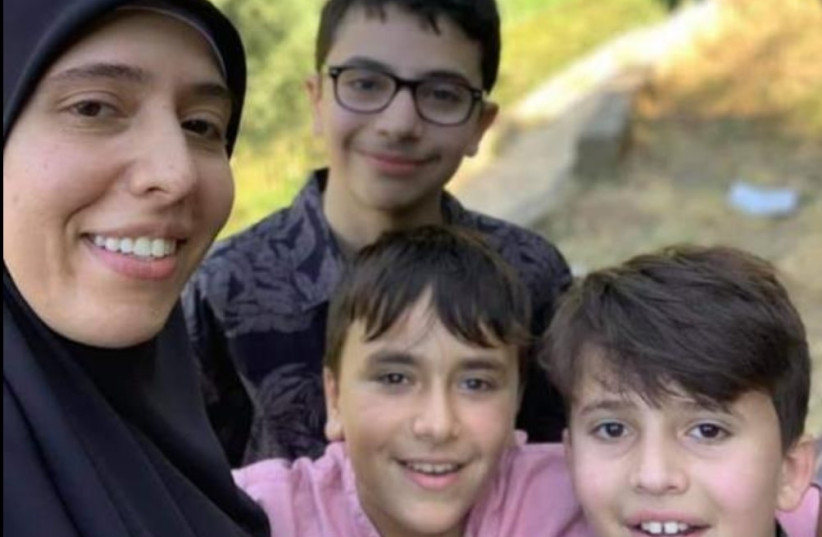For the first time since her arrest by Palestinian security forces in 2018, Suha Jbara took the stand and testified last week about how she was brutally treated at the hands of her interrogators.
Jbara, a Palestinian woman with US and Panamanian citizenship, was arrested in November 2018 during a raid by Palestinian Authority security forces on her home in the town of Turmus Ayya, north of Ramallah.
The mother of three was charged with “collaboration” with Israel, illegal possession of weapons and distributing money to Islamic charities in the West Bank.
Jbara was held in the PA’s Jericho Prison, which is referred to by many Palestinians as the “Jericho Slaughterhouse” because of allegations of torture and abuse of detainees.
During her detainment, Jbara went on a 26-day hunger strike and was hospitalized, where she was kept shackled to her bed. She was finally released in January 2019 but has since been on trial in a Palestinian court in Jericho.

Jbara’s full testimony, obtained by The Jerusalem Post, sheds light on the harsh methods used by Palestinian interrogators against detainees.
“They took me to an unknown place,” she told the three judges, Fahmi al-Uwaiwi, Islam al-Husseini and Fatmeh al-Natsheh. “I was tired and exhausted. When we entered an office, the person asked me: ‘Do you know where you are now?’ I told him: ‘In the General Investigation [Department].’ He replied: ‘No, you are now in the Jericho Slaughterhouse.’ Then they took me to the Jericho Hospital for a pregnancy test, although I was undergoing menstruation.”
Jbara said she was then taken back to prison, where she was blindfolded and handcuffed.
“The interrogator started threatening me,” she recounted. “He told me that from my face he could tell that I’m a collaborator [with Israel]. He threatened to take away my custody over my children. He also threatened me with rape and started beating me. He said he knows how to beat me without leaving signs on my body. The interrogation and beating lasted all night.”
Jbara said the second session of interrogation took place in another room, during which time she was prevented from going to the bathroom.
“The interrogator began hitting me on the head with his hand,” she said. “He was threatening me and accusing me of being a collaborator. A man from a human-rights organization came to see me, but they didn’t allow him to sit with me alone.
“Before the meeting, the interrogator told me that if I open my mouth, he will make me disappear. I wasn’t able to tell the human-rights man about the things I was subjected to during the interrogation.”
According to Jbara, the interrogation resumed after the human-rights activist left the prison.
“The interrogator told me: ‘Here, we can rape you. I can take you to the men so that they could have fun with you. I can also bring your mother and sisters.’”
In her testimony, Jbara said a doctor who was brought by the interrogators to examine her claimed she was in good health, although she was not feeling well and was physically exhausted.
When she was permitted to see her mother for two minutes, Jbara told her to warn her father and brother not to come from Panama for fear that they would be arrested.
Jbara said she was later asked to sign a confession, which she was not allowed to read.
During the interrogation, she said, she was accused of participating in Hamas rallies and supporting the families of Palestinian prisoners held in Israeli prisons and others killed by the IDF. However, she was not questioned about her alleged “collaboration” with Israel.
“They accused me of donating a sum of $100,000 to people in Nablus and claimed that I was hiding weapons in a Nido milk can at my house,” she said.
Jbara told the court she was held in solitary confinement for 19 days during her incarceration and subjected to strip searches by female officers. Since her release, she said, she has been undergoing psychiatric treatment.
Last year, Jbara’s father, Badran, told the Post he had also been threatened by the PA security forces. He said he had contacted the Panamanian Foreign Ministry to complain about the PA’s threats and the harassment of his daughter.
“I want to leave Turmus Ayya and never come back,” the wealthy businessman said. “There is no security under the Palestinian Authority. It is not safe for businessmen and investors like me. My advice to all Palestinians living abroad: Don’t go to live under the Palestinian Authority. There are no human rights there.”
